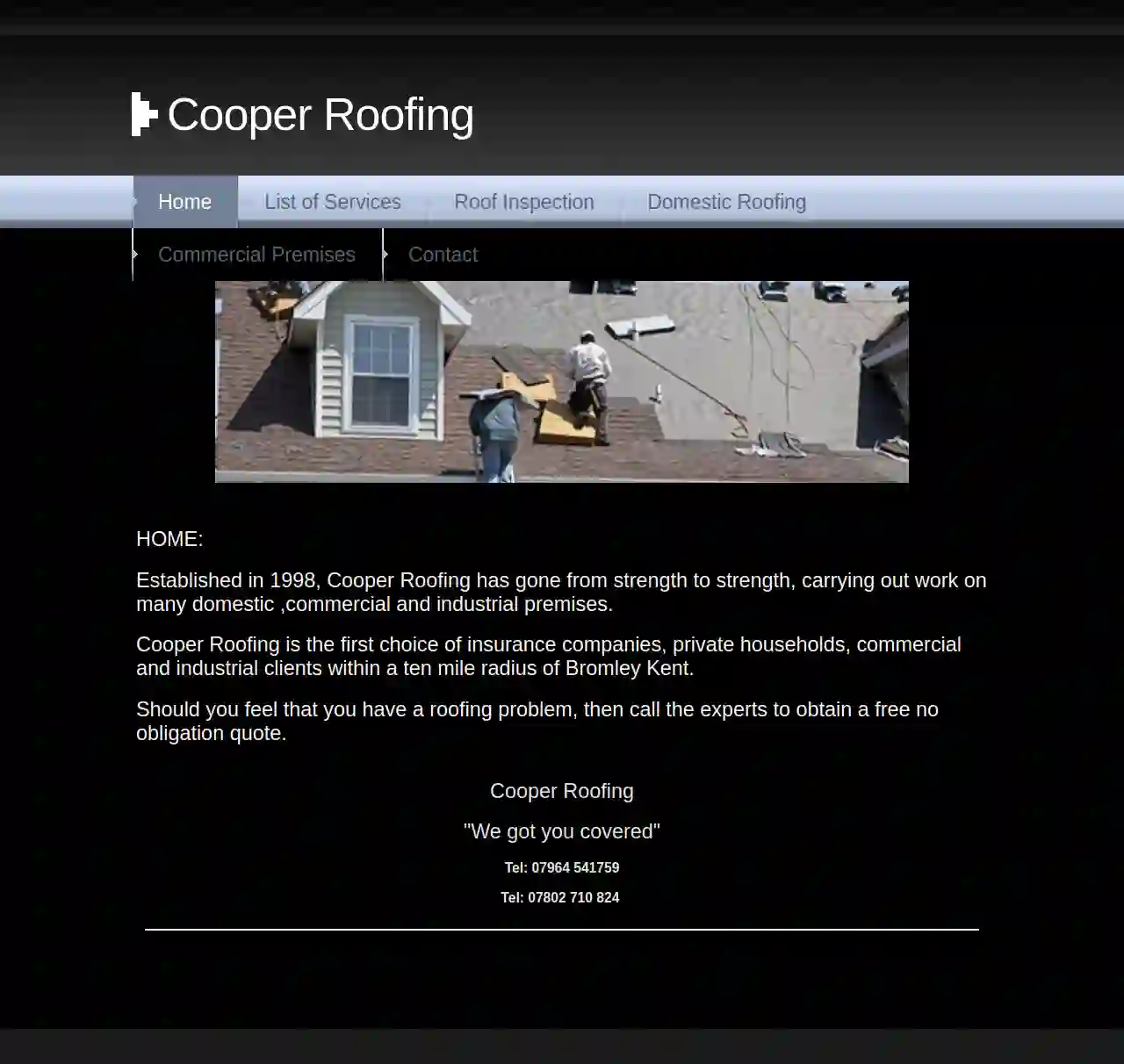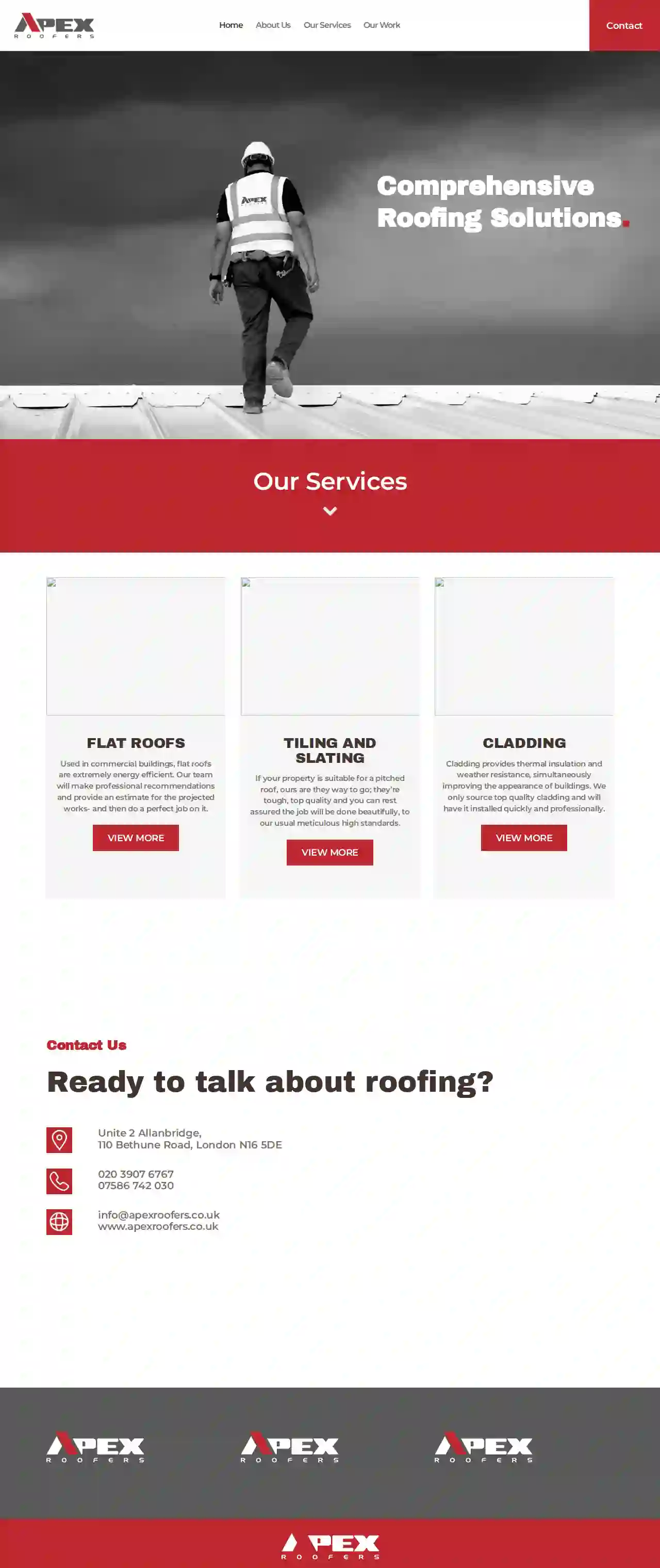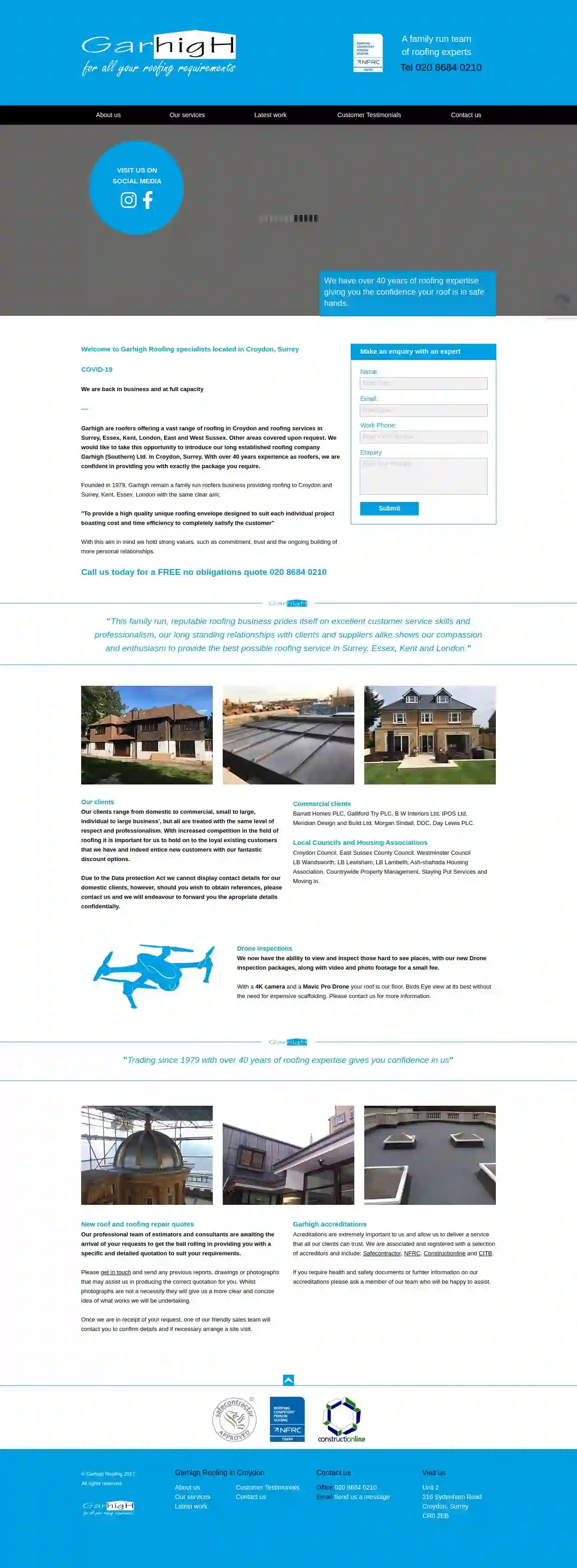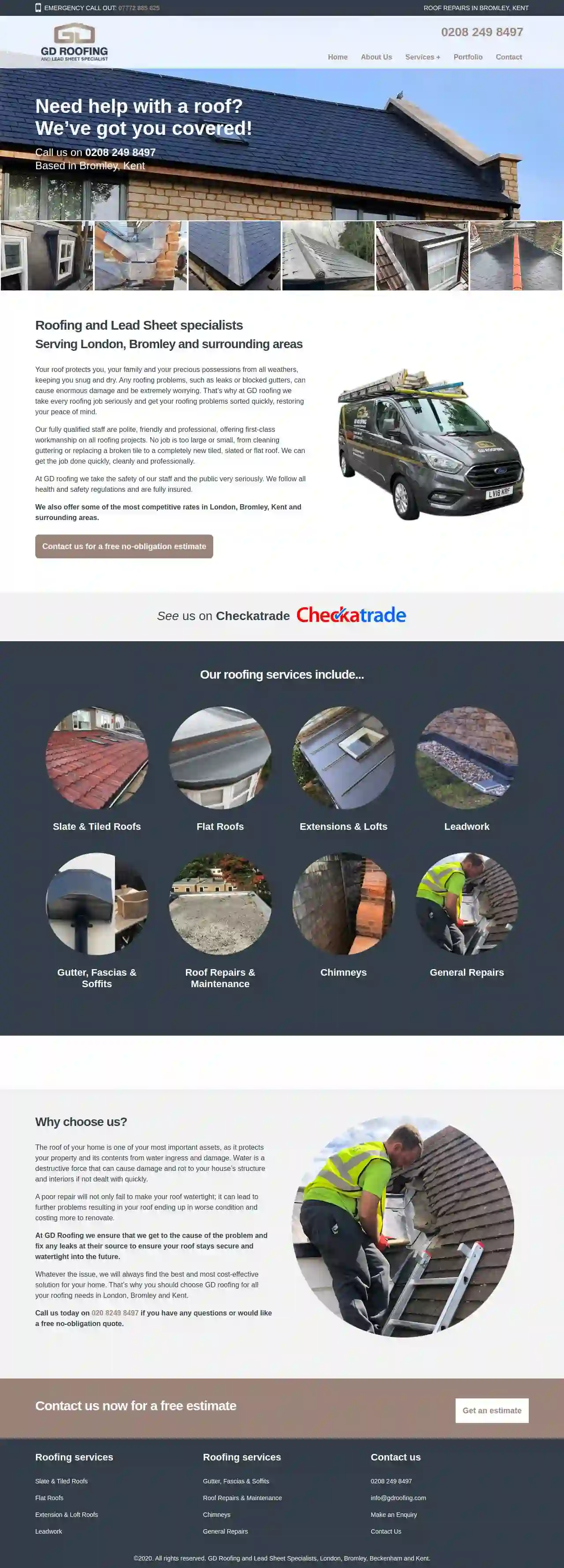Roofing Companies Catford
Top 10 Roofing Services in Catford
Receive multiple Roofing Companies quotes for your project today! Compare profiles, reviews, accreditations, portfolio, etc... and choose the best deal.

Cooper Roofing
Bromley, GBEstablished in 1998, Cooper Roofing has gone from strength to strength, carrying out work on many domestic ,commercial and industrial premises.Cooper Roofing is the first choice of insurance companies, private households, commercial and industrial clients within a ten mile radius of Bromley Kent.Should you feel that you have a roofing problem, then call the experts to obtain a free no obligation quote.Cooper Roofing "We got you covered"
- Services
- Why Us?
- Gallery
Get Quote
Apex Roofers Ltd
4.935 reviewsUnite 2 Allanbridge, 110 Bethune Road, London, N16 5DE, GBComprehensive Roofing Solutions. Our Services FLAT ROOFS Main ServicesUsed in commercial buildings, flat roofs are extremely energy efficient. Our team will make professional recommendations and provide an estimate for the projected works- and then do a perfect job on it. VIEW MORE TILING AND SLATING Main ServicesIf your property is suitable for a pitched roof, ours are they way to go; they’re tough, top quality and you can rest assured the job will be done beautifully, to our usual meticulous high standards. VIEW MORE CLADDING Main ServicesCladding provides thermal insulation and weather resistance, simultaneously improving the appearance of buildings. We only source top quality cladding and will have it installed quickly and professionally. VIEW MOREContact UsReady to talk about roofing? Unite 2 Allanbridge,110 Bethune Road, London N16 5DE 020 3907 676707586 742 030 [email protected]
- Services
- Why Us?
- Gallery
Get Quote
Eco Roofing
52 reviews7 Kingswood Way, CR2 8QL, GBEco Roofing are metal roofing specialists with over 20 years industry experience using zinc and copper materials across both residential and commercial projects. Based in Croydon, we cover London, Kent, Sussex, and Surrey, as well as specific schemes further afield. Get in touch with our team to discuss your requirements today. We offer a professional, reliable and trustworthy service. In 2002 we fitted the London Bridge Dome, winner of the John Smiths Copper Federation Award. Unlike mineral felt, it has a very long life span and comes with a 25 year guarantee. For more details, call our expert team today.
- Services
- Why Us?
- Our Team
- Gallery
Get Quote
London Platforms Roofing - High Level Roof Repair | 24/7 Emergency Roof Repair
4.229 reviews26-28 Burleigh Road, Enfield, EN1 1NY, GBLondon Platforms Roofing is a roofing company that provides a wide range of domestic, commercial, and industrial roofing solutions across London and the Home Counties. We pride ourselves on providing our customers with high-quality roofing services, using our unique fleet of lorries with cherry pickers to reach and fix roofs up to 35 meters high. Our team is passionate about roofs, knowing exactly what it takes to ensure quality and restore trust in the roofing industry.
- Services
- Why Us?
- Accreditations
- Gallery
Get Quote
Hakka Group Limited
GBHakka Group is a family-run business with two generations of experience in roofing and restoration. Founded by Dan Powell, who gained his initial experience working alongside his father in the family roofing business, Hakka Group combines traditional craftsmanship with modern project management techniques. We pride ourselves on delivering reliable, durable results for our clients, ensuring their properties are treated with the respect they deserve. Our team of skilled professionals works closely with heritage, commercial, and large residential clients in London and the Home Counties, providing a seamless service from tender to completion. We are committed to clear communication, building long-term partnerships, and exceeding client expectations.
- Services
- Why Us?
- Accreditations
- Our Team
- Gallery
Get Quote
Garhigh (Southern) Ltd
412 reviewsUnit 2 216 Sydenham Road Croydon, Surrey CR0 2EB, Surrey, Croydon, CR0 2EB, GBWe are Garhigh (Southern) Ltd., a family-run roofing company with over 40 years of experience serving Croydon, Surrey, Kent, Essex, London, and surrounding areas. We pride ourselves on providing high-quality, tailored roofing solutions to both domestic and commercial clients, big and small. Our commitment to excellent customer service, professionalism, and building lasting relationships sets us apart. We strive to deliver cost-effective and time-efficient solutions that meet the unique needs of each project. Founded in 1979, our core values include commitment, trust, and personalized service. We believe in transparent communication and working closely with our clients to ensure their complete satisfaction. Whether you need a new roof, repairs, or maintenance, our team of experienced roofers is here to help. Contact us today for a free, no-obligation quote and let us take care of your roofing needs.
- Services
- Why Us?
- Accreditations
- Our Team
- Testimonials
- Gallery
Get Quote
SV Roofing & Renovation Limited
1 Bromley Lane, Chislehurst, BR7 6LH, GBSV Roofing & Renovation Limited is a family-run business dedicated to helping you with all your roofing needs. We strive to ensure your roof stays secure for years to come by using the highest quality materials and craftsmanship. We offer a comprehensive range of services, including roofing, renovation, estimates and surveys, repairs and maintenance, and maintenance programmes. We are proud to be Approved contractors for RubberBond Fleeceback Roofing systems and Westwood Liquid Liquid Resin solutions. Our commitment to quality is reflected in our 10-20 year guarantee on defective workmanship and faulty materials, providing you with complete peace of mind. We also encourage you to read our customer reviews on Trust a Trader, Consumer Reviews, and Google Reviews to see what our satisfied clients have to say about our services.
- Services
- Why Us?
- Accreditations
- Our Team
- Testimonials
- Gallery
Get Quote
G D Roofing & Lead Sheet Specialist Ltd
4.210 reviewsFlat 1 Peter House 1 Beckenham Lane Bromley, Bromley, BR2 0DB, GBGD Roofing is an experienced company specialising in all roofing and exterior work in London, Bromley, Kent and surrounding areas. We pride ourselves on offering transparent pricing, written quotes, professional staff and a commitment to 100% customer satisfaction. Our fully qualified roofers can undertake all roofing jobs from minor repairs to complete new roofs. Whether you need repairs to tiling, guttering, leadwork, or chimneys you can trust us to get the job done quickly and cleanly. We have a range of reclaimed tiles and slates in stock, so we can repair your roof seamlessly. We can also replace roofs or complete new roofing projects on extensions and new builds. We offer the most up to date technologies in flat roofing with guarantees of up to 25 years. All our work and materials are guaranteed and we are fully insured. Roof problems can be very stressful. That is why we offer a complete roofing service to solve your roofing problems quickly. One of our experienced roofers will visit your home to survey your roof. We can provide pictures to show you the areas in need of repair. Then our experts will discuss the most cost-effective solution with you. Our friendly professional roofers will then complete the repair quickly leaving no mess. We also offer a 24-hour emergency service to make your roof watertight so you can relax knowing your home isn’t suffering further damage.
- Services
- Why Us?
- Our Team
- Gallery
Get Quote
Hammersmith Roofing & Building
513 reviewsGBAt Hammersmith Roofing & Building, we are dedicated to providing our customers with exceptional service and top-quality workmanship. We understand that your home and roof are significant investments, and we take that responsibility seriously. Our goal is to surpass your expectations and ensure your complete satisfaction with our work. We offer a comprehensive range of building and roofing services, including roof repairs, installations, and replacements. Our services also encompass gutter and siding work to ensure your entire exterior is protected. No matter your roofing or building needs, our team is here to help. Our team comprises highly skilled and experienced builders and roofing professionals committed to delivering the best possible service to our customers. We prioritize ongoing training and development to stay abreast of the latest industry trends and techniques.
- Services
- Why Us?
- Gallery
Get Quote
Inspire Contract Services Ltd
Camburgh House, 27 New Dover Road, Canterbury, Kent, CT1 3DN, GBWelcome to Inspire Contract Services Ltd, a specialist roofing and building contractor founded by Gary Slawson in 2016. Since its inauguration, Inspire has grown into one of the leading specialist refurbishment contractors, developing its extensive knowledge of the commercial roofing market and expanding its building refurbishment service offering. With strong organic growth and evolution, Inspire has moved beyond simply installing roofs and is now proud to offer an all-round quality refurbishment service to both public and private sector clients.
- Services
- Why Us?
- Accreditations
- Our Team
- Testimonials
- Gallery
Get Quote
Over 12,314+ Roofing Contractors in our network
Our roofing experts operate in Catford & surrounding areas!
Roofyng.co.uk has curated and vetted Top Roofing Companies arround Catford. Find a top & trustworthy business today.
Frequently Asked Questions About Roofing Companies
- Listed Buildings: Buildings with historical or architectural significance.
- Conservation Areas: Areas with special architectural or historical character.
- Changes to Roof Design: If you're making significant alterations to the roof's design, such as adding a dormer window or changing the pitch.
- Experience: 'How long have you been in business, and what experience do you have with my type of roof?'
- Licensing and insurance: 'Are you licensed and insured, and can I see proof of coverage?'
- Warranties: 'What warranties do you offer on your work and the materials used?'
- References: 'Can you provide references from past clients?'
- Project Timeline: 'What is the estimated timeline for completing the project?'
- Payment Terms: 'What are your payment terms, and do you require a deposit?'
- Communication: 'How will you keep me updated on the project's progress?'
- Cleanup: 'What steps will you take to protect my property during the project and ensure proper cleanup afterward?'
- Style: Consider your home's architectural style and choose a roofing material that complements it.
- Climate: Factor in your local climate conditions. Some materials perform better in extreme heat, cold, or high winds than others.
- Budget: Roofing materials have a wide range of costs. Determine your budget and choose materials that fit your financial constraints.
- Durability and Lifespan: Assess the expected lifespan and durability of different materials.
- Energy Efficiency: Choose materials with good insulation and reflectivity properties to improve your home's energy efficiency.
- Age: If your roof is nearing or exceeding its expected lifespan, it's wise to consider replacement.
- Multiple Leaks: Several leaks or leaks that reappear after repairs suggest a widespread problem.
- Extensive Damage: Large areas of damaged, missing, or deteriorated roofing materials might be too costly or difficult to repair effectively.
- Sagging or Structural Issues: Sagging, deflection, or other structural issues indicate a compromised roof that needs replacement.
- Granule Loss (Asphalt Shingles): Significant granule loss indicates weathering and reduced protection.
- Curling or Buckling Shingles: Signifies age or improper ventilation.
- Increased Energy Bills: A poorly insulated roof can lead to higher heating and cooling costs.
Do I need planning permission to replace my roof in the UK?
What questions should I ask a roofing contractor?
How do I choose the right roofing materials for my home?
What are the signs that my roof needs to be replaced?
Do I need planning permission to replace my roof in the UK?
- Listed Buildings: Buildings with historical or architectural significance.
- Conservation Areas: Areas with special architectural or historical character.
- Changes to Roof Design: If you're making significant alterations to the roof's design, such as adding a dormer window or changing the pitch.
What questions should I ask a roofing contractor?
- Experience: 'How long have you been in business, and what experience do you have with similar projects?'
- Licensing and insurance: 'Are you licensed and insured, and can I see proof of coverage?'
- Warranties: 'What warranties do you offer on your work and the materials used?'
- References: 'Can you provide references from past clients?'
- Project Timeline: 'What is the estimated timeline for completing the project?'
- Payment Terms: 'What are your payment terms, and do you require a deposit?'
- Communication: 'How will you keep me updated on the project's progress?'
- Cleanup: 'What steps will you take to protect my property during the project and ensure proper cleanup afterward?'
How do I choose the right roofing materials for my home?
- Style: Consider your home's architectural style and choose a roofing material that complements it.
- Climate: Factor in your local climate conditions. Some materials perform better in extreme heat, cold, or high winds than others.
- Budget: Roofing materials have a wide range of costs. Determine your budget and choose materials that fit your financial constraints.
- Durability and Lifespan: Assess the expected lifespan and durability of different materials.
- Energy Efficiency: Choose materials with good insulation and reflectivity properties to improve your home's energy efficiency.
What are the signs that my roof needs to be replaced?
- Age: If your roof is nearing or exceeding its expected lifespan, it's wise to consider replacement.
- Multiple Leaks: Several leaks or leaks that reappear after repairs suggest a widespread problem.
- Extensive Damage: Large areas of damaged, missing, or deteriorated roofing materials might be too costly or difficult to repair effectively.
- Sagging or Structural Issues: Sagging, deflection, or other structural issues indicate a compromised roof that needs replacement.
- Granule Loss (Asphalt Shingles): Significant granule loss indicates weathering and reduced protection.
- Curling or Buckling Shingles: Signifies age or improper ventilation.
- Increased Energy Bills: A poorly insulated roof can lead to higher heating and cooling costs.